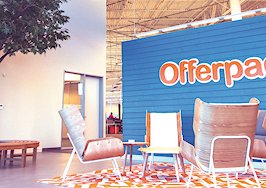The Inman community will gather virtually for Connect, June 15-17. It’s a powerhouse lineup of speakers, and our focus is on the New Normal: what business looks like on the other side of the pandemic. Let this conversation serve as an appetizer, and don’t forget to grab your ticket to June’s Inman Connect before prices go up.
Renters fleeing cities to buy homes in the suburbs. Remote home tours and closings. Bidding wars and inventory shortages. Record low interest rates.
Will the changes in real estate wrought by the pandemic turn out to be enduring, or fleeting? Revolutionary, or incremental?

Sean Black | Photo credit: Knock
Knock CEO and co-founder Sean Black believes we’re in the “third evolution of the real estate revolution,” and that changes are afoot that will benefit consumers, while keeping real estate agents at the center of the transaction.
In the first stage of the real estate revolution, listings went online, undermining the role of real estate agents as information gatekeepers. Then, consumers got access to additional context around listings like price history, market trends, and neighborhood-level school and crime data from sites like Trulia, where Black was part of the founding team.
While access to listings and contextual data made consumers better buyers, “the seller didn’t benefit at all” from these changes, Black said. As home values climbed, so did commission revenue, as the traditional real estate commission structure remained intact.
But today, Black sees a “transaction revolution,” with buyers and sellers demanding — and getting — more transparency, liquidity and convenience. This third stage of the revolution began before the pandemic, and will continue after it fades. But COVID accelerated trends that have been brewing for some time, like paperless closings and iBuying.
“COVID forced the industry to transform,” Black said. “Escrow and title and notary — things that seemed like the smallest part of the transaction — nobody was motivated to change those before. Banks wanted wet signatures, but COVID forced their hands.”
With listings in short supply during the pandemic, buyers making cash offers often have an advantage over those who haven’t secured financing for a purchase. Even making an offer contingent on the sale of your own home can hurt a buyer’s chances of success.
That’s part of the value proposition of cash offer startups that position themselves as transaction facilitators. Companies like Homeward and Ribbon purchase homes on behalf of their buyer clients. That’s a twist on the “instant offer” iBuyer business model, pioneered by companies like Offerpad and Opendoor, which got their start buying properties from sellers who didn’t want to deal with the inconvenience of putting their homes on the market.
“iBuyers figured out how to invert the transaction, and that’s benefitted all of us,” Black said. But there are “different flavors” of ibuyer business models — some better suited to today’s conditions than others.
Black thinks iBuyers that primarily make instant offers to sellers who don’t want to list their homes are probably digging themselves into a hole right now.
From the consumer’s standpoint, “It’s an interesting solution if you don’t want to list your home, but you also take a discount for walking away” with a cash offer. In today’s seller’s markets, “instant offer” iBuyers are either having to pay more, charge less, or buy fewer homes — which makes it harder to grow, or turn a profit.
When the pandemic created lopsided demand for homes last summer, Offerpad and Opendoor launched traditional brokerage listing services, “underlining the growing convergence of iBuyers and the traditional industry,” real estate tech consultant and Inman contributor Mike DelPrete noted at the time.
Knock also tweaked its business model. After launching a service in 2015 where it acted as both a buyer and seller on behalf of clients, last summer the company introduced “the Knock Home Swap” service.
Now available in 40 markets in 10 states, Home Swap lets homeowners tap the equity in their existing home to make a non-contingent offer and close on a new home that’s financed by Knock — before putting their old home on the market. Knock also provides an interest-free bridge loan that covers the buyer’s down payment, pays for cosmetic improvements to the old house to maximize its market value, and covers up to six months of mortgage payments on the old house.
Knock will even handle the prep work needed to get the client’s old house ready for sale, and provides separate software platforms where consumers, agents, and other providers can manage every aspect of the transaction.
“No other platform, not even big mortgage companies, have their hands in all those pieces of the transaction,” Black said.
Having raised $600 million and hired Goldman Sachs to help it prepare for a public offering, Knock is now on a hiring binge, with plans to be in more than 100 markets by 2023.
“Luck is the intersection of preparedness and opportunity,” Black said of the demand for Home Swap, which has helped real estate agents drum up new business during the pandemic and keep transactions moving forward.

Jamie Glenn
Part of the reason Knock is so well positioned, Black said, is that he and COO and co-founder Jamie Glenn have sought to build a platform that makes life easier for real estate agents to serve their clients, but still depends on their input.
“Jamie and I have made huge bets that the real estate agent is going to remain at the center of the transaction, for a lot of reasons,” Black said.
While Knock is ultimately a tech company that helps automate the process of buying and selling a home, real estate agents “are in our app,” providing local expertise, nuance, and “help through the emotional part of the transaction.”
“So the relationship we have with agents is symbiotic — [the Knock Home Swap] helps get clients off the fence, and the agent looks like a rock star and makes twice as much money because they’re doing the buy side and the sell side,” Black said.
The pandemic has highlighted disparities in wealth and class, with educated professionals better able to take advantage of opportunities to work remotely, boosting demand for homes in the suburbs and rural areas. Black believes that trend actually predates the pandemic, and that anything that makes real estate more “liquid” — easier to buy and sell — benefits average Americans.
He said Knock’s typical customer sells a home for $300,000 and spends $400,000 when they’re the buyer.
“This is the average American family, the bread and butter of the real estate market,” he said. “The migration to these smaller cities we’ve seen in the last 10 to 15 years, I’d like to think we helped the average American get more house in a better place with a lower cost of living.”
While many economists are concerned that the dramatic runup in home prices threatens to cancel out the affordability benefits provided by low mortgage rates, Black is optimistic that inventory shortages will soon ease, and that mortgage rates will stay low.
“I’m not an economist, but the Fed committing to hold rates down for the foreseeable future is going to really help homebuyers and sellers in general,” he said. “I think after this summer, housing inventory is going to come back to a reasonable place. In September, when kids are back in physical school, families sort of settle down a bit. You’ll see more properties, and fewer buyers.”
When the dust settles, Black says consumers will weigh “3 Cs” when choosing who to work with: Certainty, convenience, and cost.
“I think what we saw before COVID, certainty and convenience were the most important,” Black said. “I think the craze of, ‘Everything is a bidding war,’ will dissipate, and certainty and convenience will bubble back up as what’s important.”













